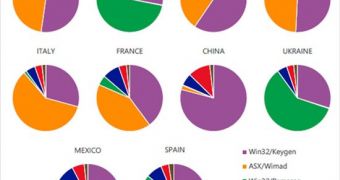Microsoft mentioned in its new Security Intelligence Report that malware linked with software activation key generators grows up at an unstoppable pace and recommended users to avoid downloading this kind of applications.
Win32/Keygen seems to be the main threat, according to statistics revealed by the Redmond-based technology giant. China, the United States, Brazil, Mexico and Spain are the most affected countries when it comes to this particular infection, closely followed by Turkey, France and Russia.
There are however several other malware infections found in the wild, including ASX/Wimad, Win32/Pameseg, Win32/Wpakill, Win32/Gendows and Win32/Patch.
“In the first six months of 2012, the threat family Win32/Keygen, representing software activation key generators, was detected nearly five million times. Keygen detections have increased by a factor of 26 since the first half of 2010 and today Keygen is the number one consumer threat family worldwide, rising above other prevalent threat families like Pornpop, Blacole, Conficker and FakePAV,” Microsoft said in the new report.
Installing a full-featured security software solution seems to be the easiest way to protect your computer from this threats, but Microsoft recommends users to stay away from malicious websites and apps that could deploy malware on their systems.
Key generators are not malware infections per se, but standalone applications that could redirect users to dangerous content, Microsoft explains.
“More than 76% (that’s approximately 3.8 million of the 5 million aforementioned Keygen detections) of computers reporting Keygen detections in the first half of 2012 also reported detections of other malware families,” the company said in a post published on its Security Blog.

 14 DAY TRIAL //
14 DAY TRIAL //